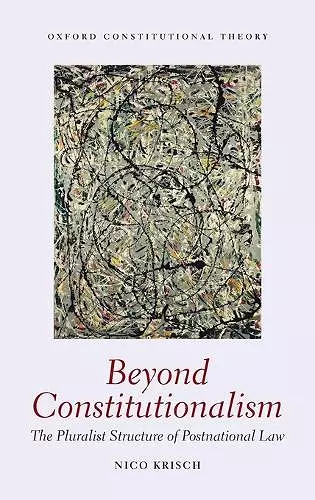Beyond Constitutionalism
The Pluralist Structure of Postnational Law
Format:Hardback
Publisher:Oxford University Press
Published:28th Oct '10
Currently unavailable, and unfortunately no date known when it will be back
This hardback is available in another edition too:
- Paperback£57.00(9780199659968)

Winner of the ASIL Scholarship Award's Certificate of Merit for Preeminent Contribution to Creative Scholarship 2012
Rejecting current arguments that international law should be 'constitutionalized', this book advances an alternative, pluralist vision of postnational legal orders. It analyses the promise and problems of pluralism in theory and in current practice - focusing on the European human rights regime, the European Union, and global governance in the UN.Under pressure from globalisation, the classical distinction between domestic and international law has become increasingly blurred, spurring demand for new paradigms to construe the emerging postnational legal order. The typical response of constitutional and international lawyers as well as political theorists has been to extend domestic concepts - especially constitutionalism - beyond the state. Yet as this book argues, proposals for postnational constitutionalism not only fail to provide a plausible account of the changing shape of postnational law but also fall short as a normative vision. They either dilute constitutionalism's origins and appeal to 'fit' the postnational space; or they create tensions with the radical diversity of postnational society. This book explores an alternative, pluralist vision of postnational law. Pluralism does not rely on an overarching legal framework but is characterised by the heterarchical interaction of various suborders of different levels - an interaction that is governed by a multiplicity of conflict rules whose mutual relationship remains legally open. A pluralist model can account for the fragmented structure of the European and global legal orders and it reflects the competing (and often equally legitimate) claims for control of postnational politics. However, it typically provokes concerns about stability, power and the rule of law. This book analyses the promise and problems of pluralism through a theoretical enquiry and empirical research on major global governance regimes, including the European human rights regime, the contestation around UN sanctions and human rights, and the structure of global risk regulation. The empirical research reveals how prevalent pluralist structures are in postnational law and what advantages they possess over constitutionalist models. Despite the problems it also reveals, the analysis suggests cautious optimism about the possibility of stable and fair cooperation in pluralist settings.
In this eloquently written and well-documented book, Krisch embraces legal pluralism as a promising way to deal with postnational law that is characterized by an international legal order in which the centre of gravity ha[s] shifted away from the nation-state. * Tom de Boer, Leiden Journal of International Law *
Krisch in this book not only presents a systematic defense of the pluralist view but also provides an incisive diagnosis of the state of our globalizing world. * Ming-Sung Kuo, Law and Politics Book Review *
Krisch's book is a pleasure to read. It contains a clearly written, original and thought-provoking defense of a pluralist understanding of postnational law. * Wouter Werner, Edinburgh Law Review *
Reviewing this book has been an enormously edifying experience...[The] book...explores important ideas and suggests new ways forward. * Modern Law Review *
Nico Krisch has written one of the most lucid and circumspect contributions, which is likely to show significant repercussions in the field...In sum, Nico Krisch has written a truly wonderful book. * Ingo Venzke, International Law and Politics *
ISBN: 9780199228317
Dimensions: 239mm x 163mm x 28mm
Weight: 720g
384 pages